The Army Noncommissioned Officer Guide (FM 7-22․7) is a critical resource for NCOs‚ outlining leadership principles‚ responsibilities‚ and professional development․ It serves as a foundational tool for enlisted leaders‚ emphasizing mentorship‚ core Army values‚ and the evolving role of NCOs in modern military operations․
Overview of the NCO Guide
The Army Noncommissioned Officer Guide‚ or FM 7-22․7‚ is the official handbook for NCOs‚ detailing their roles‚ responsibilities‚ and professional development․ It replaces the earlier Training Circular 22-6 and serves as a comprehensive resource for enlisted leaders․ The guide covers leadership principles‚ mentorship‚ and decision-making‚ providing NCOs with the tools to lead effectively․ It is designed for enlisted soldiers and leaders seeking to enhance their skills and understanding of the NCO role in the modern Army․
Importance of Leadership in the NCO Role
Leadership is the cornerstone of the NCO role‚ as noncommissioned officers are entrusted with guiding‚ mentoring‚ and inspiring soldiers․ Effective leadership ensures mission accomplishment‚ fosters unit cohesion‚ and develops future leaders․ NCOs must embody the Army’s core values‚ lead by example‚ and make sound decisions that reflect integrity and responsibility․ Strong leadership at the NCO level directly impacts soldier morale‚ readiness‚ and overall mission success‚ making it the most critical aspect of their role in the Army․
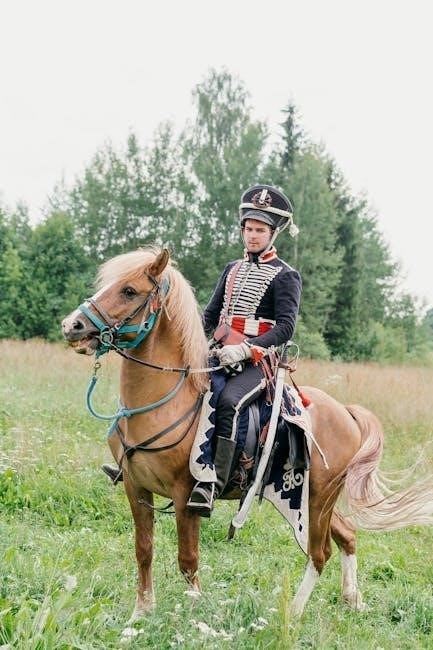
Role and Responsibilities of Noncommissioned Officers
Noncommissioned Officers (NCOs) are pivotal in leading‚ training‚ and developing soldiers to achieve mission success․ They hold authority‚ ensuring accountability and upholding Army standards and discipline․
Duties of an NCO
Noncommissioned Officers are responsible for leading‚ mentoring‚ and training soldiers to achieve mission success․ They enforce discipline‚ maintain unit cohesion‚ and ensure operational readiness․ NCOs provide guidance through counseling and decision-making‚ fostering professional growth and accountability․ They act as a bridge between enlisted personnel and officers‚ communicating effectively to execute commands․ Their duties also include monitoring performance‚ addressing challenges‚ and upholding Army standards‚ ensuring soldiers are prepared for challenges and capable of meeting operational demands while adhering to core values and regulations․
Authority and Accountability
NCOs hold inherent authority by rank‚ ensuring discipline and standards are maintained․ They are accountable for their actions‚ decisions‚ and the performance of their teams․ NCOs must lead ethically‚ fostering trust and respect while adhering to core Army values․ Their accountability extends to mission execution‚ resource management‚ and the welfare of soldiers‚ demonstrating unwavering responsibility and commitment to the organization’s goals and ethical standards․
Leadership Principles for NCOs
NCOs embody leadership principles that foster trust‚ discipline‚ and mission accomplishment․ Leading by example‚ they prioritize soldiers’ welfare‚ communicate clearly‚ and make sound decisions․ Empathy‚ adaptability‚ and resilience are key traits‚ enabling NCOs to inspire and guide their teams effectively․ These principles ensure cohesion‚ morale‚ and readiness‚ aligning actions with Army values to achieve organizational goals and prepare soldiers for success in diverse operational environments․

Leadership and Mentorship
Leadership and mentorship are cornerstone responsibilities for NCOs‚ fostering soldier development and unit cohesion․ Effective mentorship guides personal and professional growth‚ enhancing mission readiness and Army values․
Mentorship in the Army
Mentorship is a cornerstone of NCO leadership‚ fostering personal and professional growth among soldiers․ NCOs guide subordinates through tailored development plans‚ enhancing skills and readiness․ Effective mentorship builds trust‚ improves performance‚ and aligns individual goals with unit objectives․ It empowers soldiers to overcome challenges‚ embrace leadership roles‚ and contribute to mission success․ Mentorship is vital for sustaining a competent and resilient force‚ ensuring the Army’s continued effectiveness in evolving operational environments․
Counseling Techniques for NCOs
NCOs employ structured counseling techniques to address performance‚ development‚ and personal issues․ Active listening‚ empathy‚ and clear communication are essential․ Regular feedback sessions help soldiers set goals and track progress․ Constructive criticism and positive reinforcement motivate improvement․ Counseling fosters accountability‚ builds trust‚ and ensures soldiers meet standards․ Effective techniques enhance unit cohesion and readiness‚ empowering NCOs to lead successfully․
Decision-Making and Problem-Solving
NCOs must master decision-making and problem-solving skills to effectively lead and achieve mission success․ They use analytical thinking to evaluate situations‚ identify solutions‚ and implement actions․ Structured decision-making processes ensure clarity and accountability․ Problem-solving techniques involve assessing risks‚ considering alternatives‚ and selecting the best course of action․ Effective communication and collaboration with the team enhance the quality of decisions․ NCOs are expected to make sound judgments under pressure‚ balancing mission requirements with the well-being of their soldiers․
Professional Development for NCOs
NCO professional development includes structured education‚ training‚ and mentorship programs to enhance leadership and technical skills‚ ensuring continuous growth and readiness to meet evolving mission demands effectively․
Training and Education
Training and education are cornerstone components of NCO development‚ encompassing structured programs like the NCO Education System․ These initiatives enhance leadership‚ technical‚ and tactical skills‚ ensuring NCOs are prepared to lead effectively in diverse operational environments․ Continuous learning opportunities‚ including advanced courses and mentorship‚ foster professional growth and adaptability․ The Army Noncommissioned Officer Guide emphasizes the importance of education in equipping NCOs with the knowledge and expertise needed to meet the challenges of modern warfare and evolving mission requirements successfully․
Career Progression and Promotion
Career progression and promotion for NCOs are based on merit‚ performance‚ and the needs of the Army․ Promotion boards evaluate leadership potential‚ technical expertise‚ and adherence to Army values․ NCOs advance through ranks like Corporal‚ Sergeant‚ and Staff Sergeant‚ with each rank requiring increased responsibility․ Continuous performance evaluations and formal reviews ensure fair and competitive promotions․ Career development aligns with individual goals and unit requirements‚ fostering a capable and adaptive NCO Corps to meet evolving mission demands effectively․
Continuous Learning Opportunities
Continuous learning is essential for NCOs to stay effective in their roles․ The Army provides various educational resources‚ including formal schools‚ online courses‚ and professional development workshops․ NCOs can pursue advanced leadership training‚ specialized skills‚ and certifications to enhance their expertise․ These opportunities ensure NCOs remain adaptable to evolving military strategies and technologies‚ enabling them to lead effectively in dynamic environments․ Lifelong learning fosters professional growth and prepares NCOs for future challenges‚ ensuring mission success and the development of a capable and agile force․
The Evolving Role of NCOs
The role of NCOs continues to adapt to modern military challenges‚ emphasizing leadership‚ technical expertise‚ and strategic thinking․ NCOs are pivotal in addressing outdated traditions‚ embracing innovation‚ and fostering change within the Army‚ ensuring readiness for future operations․
Adapting to Modern Warfare
Noncommissioned officers play a critical role in modern warfare‚ leading soldiers in complex‚ dynamic environments․ As warfare evolves‚ NCOs must adapt by developing advanced technical skills and strategic thinking․ They are essential in countering emerging threats and leveraging new technologies․ Modern NCOs must balance traditional leadership with innovative problem-solving to maintain operational effectiveness․ Their ability to adapt ensures the Army remains competitive and capable of addressing contemporary and future challenges effectively․
Addressing Outdated Traditions
Noncommissioned officers are central to identifying and challenging outdated traditions that hinder progress․ Junior leaders are uniquely positioned to drive change‚ ensuring practices align with modern values and mission requirements․ By fostering innovation and inclusivity‚ NCOs help the Army evolve while preserving its core identity․ This balance between tradition and progress is vital for maintaining relevance and effectiveness in a changing world․
Junior Leaders as Agents of Change

Historical Context of NCOs
The NCO Corps traces its origins to the earliest days of the U․S․ Army‚ with NCOs playing crucial roles in historical conflicts and evolving over time․
Origins of the NCO Corps
The Noncommissioned Officer Corps originated during the American Revolution‚ where experienced soldiers emerged as leaders‚ forming the backbone of the Continental Army․ These early NCOs were responsible for maintaining discipline and training troops‚ establishing the foundation for the modern NCO role․
Historical Contributions of NCOs
Noncommissioned officers have played a pivotal role in shaping the U․S․ Army’s history․ From the Revolutionary War to modern conflicts‚ NCOs have consistently demonstrated leadership‚ discipline‚ and adaptability․ Their contributions in training‚ unit cohesion‚ and combat have been instrumental in achieving military success․ Historical records highlight NCOs’ ability to inspire soldiers‚ maintain morale‚ and execute missions effectively․ Their legacy continues to influence the Army’s leadership model‚ emphasizing the importance of enlisted leaders in both combat and peacetime operations․
Evolution of NCO Roles Over Time
The role of Noncommissioned Officers has evolved significantly over time‚ adapting to changing military needs and operational complexities․ Historically‚ NCOs focused on discipline and basic training‚ but their responsibilities expanded during World War II and Vietnam‚ where they took on leadership roles in combat․ Modern NCOs are expected to be strategic thinkers‚ mentors‚ and experts in advanced tactics‚ reflecting the Army’s shift toward decentralized command and asymmetric warfare․ This evolution underscores their critical role in both traditional and contemporary military operations․

Ethical and Moral Considerations
Ethical and moral considerations are fundamental to NCOs‚ who must uphold core Army values and lead by example․ NCOs ensure decisions align with moral principles‚ fostering trust and integrity within units․
Core Army Values and NCOs
Core Army values—loyalty‚ duty‚ respect‚ selfless service‚ honor‚ integrity‚ and personal courage—serve as the moral foundation for NCOs․ These values guide their decisions‚ actions‚ and leadership‚ ensuring they set a high ethical standard․ NCOs are responsible for upholding and teaching these principles‚ which foster trust‚ discipline‚ and unity within the unit․ By embodying these values‚ NCOs inspire soldiers to adhere to the Army’s moral code‚ promoting a culture of integrity and accountability that strengthens mission success and unit cohesion․
Ethical Decision-Making
Ethical decision-making is a cornerstone of NCO leadership‚ ensuring actions align with Army values and legal standards․ NCOs must apply sound judgment in complex situations‚ balancing mission requirements with moral principles․ The NCO Guide emphasizes the importance of integrity and accountability in decision-making‚ fostering trust within the unit․ By adhering to ethical guidelines‚ NCOs maintain discipline‚ uphold the Army’s reputation‚ and ensure mission success while preserving the well-being of soldiers and civilians․ Ethical decisions reinforce the Army’s commitment to justice and morality․
Moral Leadership in the Army
Moral leadership in the Army is vital for fostering a culture of integrity and respect․ NCOs set the standard by exemplifying core values such as honor‚ courage‚ and commitment․ They must lead by example‚ ensuring their actions inspire trust and adherence to ethical standards․ Moral leadership not only shapes individual character but also strengthens unit cohesion and mission readiness․ By promoting a morally grounded environment‚ NCOs contribute to the Army’s legacy of excellence and uphold its reputation as a force for good․ Their influence extends beyond duty‚ shaping the moral fabric of the organization․
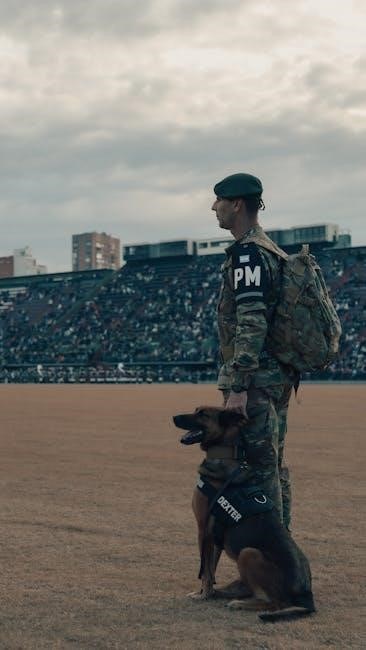
Legal and Administrative Responsibilities
NCOs must understand military justice‚ administrative procedures‚ and legal implications of their actions․ They ensure compliance with regulations‚ maintain discipline‚ and manage documentation accurately․
Understanding Military Justice
Understanding military justice is crucial for NCOs to maintain discipline and order․ The Uniform Code of Military Justice (UCMJ) governs legal procedures‚ ensuring accountability․ NCOs must be familiar with legal frameworks‚ procedures for reporting violations‚ and the role of legal advisors․ They are responsible for enforcing standards and conducting investigations․ Proper legal knowledge ensures fair treatment of soldiers and upholds the integrity of the military justice system‚ fostering a disciplined and effective force․
Administrative Duties of NCOs
Administrative duties are essential for NCOs to ensure unit efficiency․ These include maintaining personnel records‚ processing paperwork‚ and managing supply inventories․ NCOs oversee enlistment and promotion processes‚ ensuring compliance with regulations․ They also coordinate training schedules and maintain operational readiness․ Effective administrative management supports mission execution and ensures seamless unit operations․ NCOs must stay organized and detail-oriented to handle these critical tasks‚ which are vital for maintaining discipline and readiness within the unit․
Legal Implications of NCO Actions
NCOs must understand the legal implications of their actions‚ as they are held to high standards of conduct․ Their decisions can impact military justice‚ unit discipline‚ and operational integrity․ NCOs are responsible for adhering to the Uniform Code of Military Justice (UCMJ) and ensuring soldiers under their leadership comply with legal and ethical standards․ Misconduct or unethical behavior can result in legal consequences‚ damaging both individual careers and unit cohesion․ Legal awareness is crucial for maintaining accountability and upholding the Army’s values․
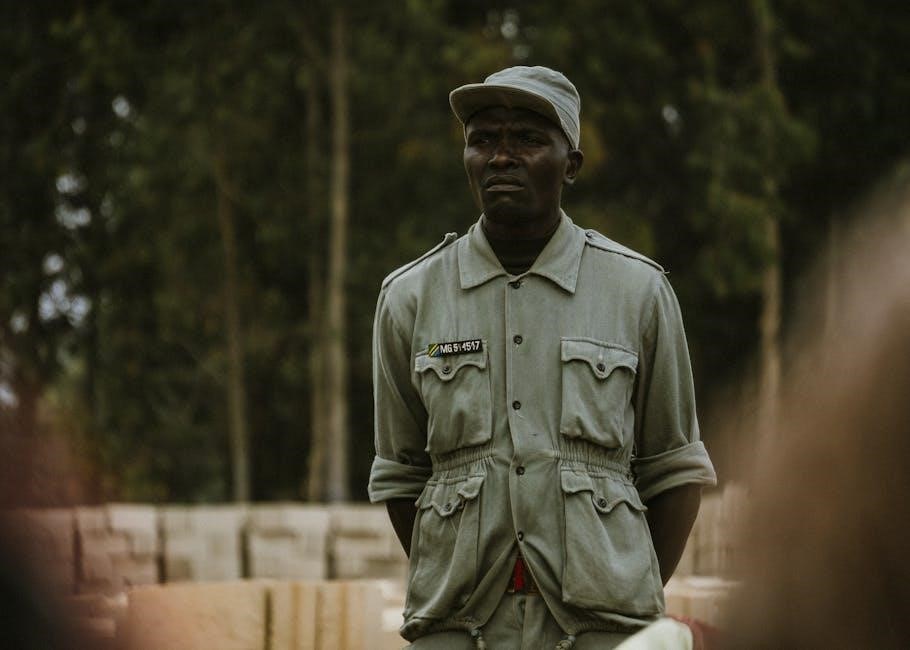
Communication and Teamwork
Effective communication and teamwork are vital for NCOs to collaborate across ranks‚ convey plans clearly‚ and achieve mission goals․ Fostering open dialogue and mutual respect enhances team success․
Effective Communication Skills
Effective communication is essential for NCOs to convey clear instructions‚ foster teamwork‚ and ensure mission success․ Clear‚ concise language helps avoid misunderstandings‚ while active listening builds trust and understanding․ Non-verbal cues‚ such as body language and tone‚ also play a crucial role in conveying messages․ NCOs must adapt their communication style to diverse audiences‚ ensuring clarity and engagement․ Leveraging technology for communication‚ like digital platforms‚ enhances efficiency but must be balanced with face-to-face interactions to maintain strong relationships and unit cohesion․
Building and Leading Teams
Building and leading effective teams is a cornerstone of an NCO’s role․ NCOs foster a positive team environment by empowering soldiers‚ promoting unity‚ and ensuring shared goals․ Leading by example‚ NCOs demonstrate professionalism and accountability‚ which inspires trust and commitment․ Open communication and recognition of individual strengths enhance team cohesion․ By addressing conflicts and encouraging collaboration‚ NCOs create a culture of mutual respect and collective success‚ ensuring teams are mission-focused and prepared to overcome challenges together․
Collaboration with Other Ranks
Effective collaboration between NCOs and other ranks is essential for mission success․ NCOs work closely with junior soldiers‚ warrant officers‚ and commissioned officers‚ fostering mutual respect and trust․ By maintaining open communication and leveraging diverse perspectives‚ NCOs ensure seamless coordination across ranks․ This collaboration strengthens unit cohesion‚ enhances problem-solving‚ and promotes a shared understanding of goals․ NCOs bridge gaps between leadership and enlisted personnel‚ ensuring a unified and efficient team effort in achieving organizational objectives․
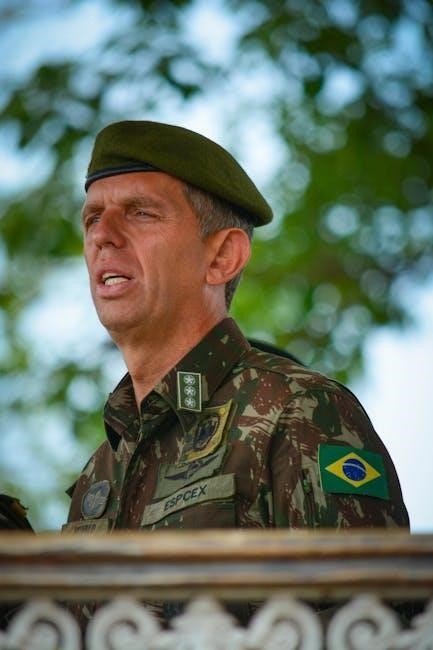
Health and Wellness
Health and wellness are critical for NCOs to maintain peak performance․ This includes adhering to physical fitness standards‚ promoting mental health awareness‚ and achieving work-life balance to ensure readiness and resilience․
Physical Fitness Standards
Physical fitness is a cornerstone of military readiness․ NCOs must meet rigorous Army Combat Fitness Test (ACFT) standards‚ emphasizing strength‚ endurance‚ and agility․ Leaders set the example‚ ensuring soldiers maintain peak physical condition․ Regular exercise and healthy habits are essential for mission success․ NCOs promote a culture of fitness‚ fostering resilience and readiness․ Physical fitness standards ensure soldiers can perform duties effectively‚ adapt to combat scenarios‚ and uphold the Army’s high performance expectations․
Mental Health Awareness
Mental health is critical for mission success and personal well-being․ NCOs play a vital role in promoting awareness and encouraging soldiers to seek help without stigma․ Leaders must recognize signs of stress‚ anxiety‚ or other mental health challenges․ By fostering open communication and providing resources‚ NCOs help soldiers maintain resilience․ Addressing mental health early prevents issues from escalating‚ ensuring readiness and overall unit effectiveness․ NCOs are key in creating a supportive environment that prioritizes mental well-being․
Work-Life Balance for NCOs
Work-life balance is essential for NCOs to maintain productivity and overall well-being․ Leaders often face demanding roles‚ but managing personal time is crucial to prevent burnout․ Encouraging hobbies‚ family time‚ and stress management techniques helps NCOs recharge․ A balanced lifestyle enhances focus‚ decision-making‚ and leadership effectiveness‚ benefiting both the individual and the unit․ Prioritizing self-care ensures NCOs remain mentally and physically prepared to lead and fulfill their responsibilities effectively․
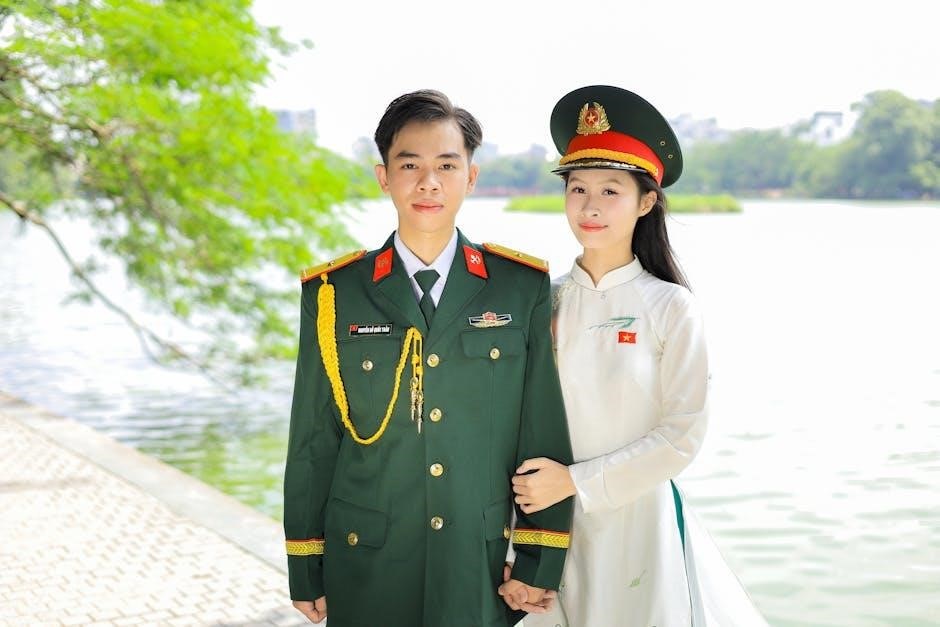
Mission Preparation and Execution
NCOs play a vital role in mission planning‚ organizing‚ and leading soldiers․ Effective execution requires clear communication‚ adaptability‚ and decisive leadership to achieve objectives successfully․
Planning and Organizing Missions
Planning and organizing missions are critical responsibilities for NCOs‚ ensuring objectives are clearly defined and achievable․ NCOs gather intelligence‚ assess risks‚ and allocate resources effectively․ They develop detailed timelines‚ coordinate with teams‚ and ensure all members understand their roles․ Effective communication and contingency planning are essential to adapt to changing situations․ NCOs must balance mission requirements with soldier safety‚ leveraging their leadership skills to execute plans decisively․ This process ensures seamless mission execution and achieves strategic goals efficiently․
Leading Soldiers in Combat
Leading soldiers in combat demands exceptional courage‚ decision-making‚ and situational awareness․ NCOs set the example‚ inspiring confidence and discipline under fire․ They prioritize soldier safety while achieving mission objectives‚ often making split-second decisions that impact outcomes․ Effective communication and adaptability are crucial‚ as NCOs must rapidly adjust tactics to counter evolving threats; Their leadership ensures unity and resilience‚ fostering trust within the unit․ Combat leadership is the ultimate test of an NCO’s training‚ experience‚ and commitment to mission success․
Post-Mission Analysis and Debriefing
Post-mission analysis and debriefing are essential for evaluating mission execution and identifying lessons learned․ NCOs lead these sessions to assess successes‚ failures‚ and areas for improvement․ Soldiers provide feedback‚ fostering transparency and accountability․ Key takeaways are documented to refine future operations and enhance team performance․ This process strengthens unit cohesion‚ improves tactics‚ and ensures continuous growth‚ ultimately contributing to mission success and readiness for future challenges․
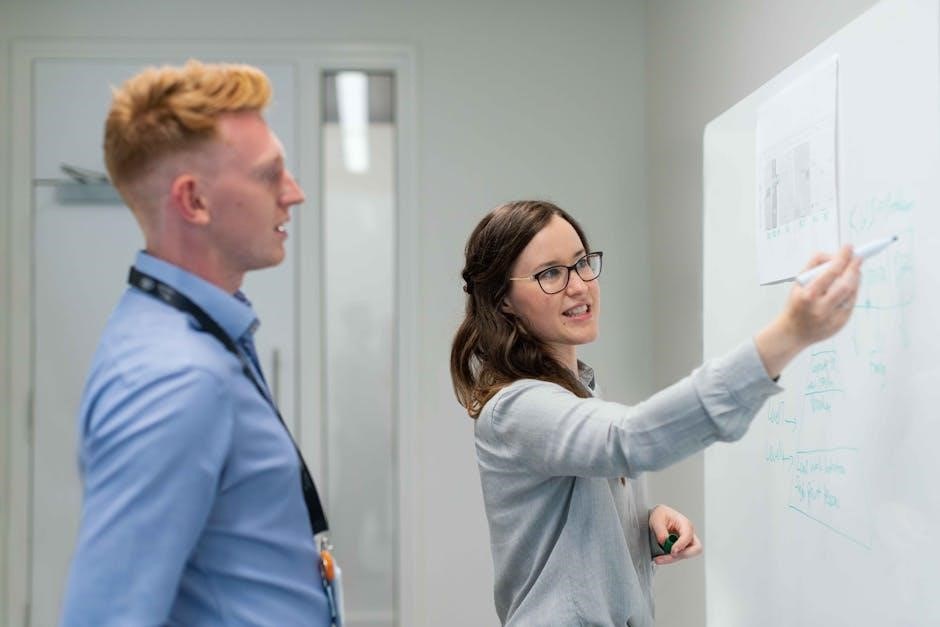
Community and Civic Engagement
Community and Civic Engagement involves NCOs fostering positive relationships with local communities‚ supporting outreach programs‚ and representing the Army’s values to promote goodwill and understanding․
NCOs in Civil-Military Relations
NCOs play a vital role in civil-military relations by fostering trust and cooperation between the Army and civilian communities․ They build partnerships through community service‚ public events‚ and outreach programs‚ ensuring the Army’s values align with societal expectations․ Their actions and conduct significantly influence public perception‚ making them ambassadors of the military․ By engaging in civic activities‚ NCOs strengthen mutual respect and understanding‚ reinforcing the Army’s commitment to serving the nation while maintaining professional integrity․
Community Service and Outreach
Community service and outreach are integral to the NCO’s role‚ fostering positive relationships between the military and civilians․ NCOs often lead or participate in volunteer programs‚ educational initiatives‚ and disaster relief efforts․ These activities demonstrate the Army’s commitment to societal well-being and reinforce its core values․ By engaging in outreach‚ NCOs not only contribute to community development but also enhance public understanding and trust in the military․ Such efforts strengthen civil-military bonds and reflect the Army’s dedication to serving both at home and abroad․
Representing the Army in Public
Representing the Army in public is a critical responsibility for NCOs‚ as they embody the organization’s values and standards․ Whether in uniform or civilian attire‚ NCOs must conduct themselves professionally‚ reflecting the Army’s image positively․ Public appearances‚ speeches‚ and community engagements are opportunities to showcase leadership and integrity․ NCOs serve as ambassadors‚ fostering trust and respect for the military․ Their actions and demeanor directly impact public perception‚ making it essential to uphold the highest standards of conduct and professionalism at all times․
The Army Noncommissioned Officer Guide underscores the vital role of NCOs in leadership‚ mentorship‚ and mission execution․ Their influence shapes soldiers and ensures the Army’s continued success and legacy․
Summarizing the NCO Guide
The Army Noncommissioned Officer Guide (FM 7-22․7) provides a comprehensive overview of the NCO’s role‚ emphasizing leadership‚ mentorship‚ and professional development․ It outlines responsibilities‚ authority‚ and ethical considerations‚ while addressing modern challenges and the evolution of NCO roles․ The guide serves as a foundational resource for enlisted leaders‚ ensuring they are equipped to lead‚ train‚ and inspire soldiers․ By adhering to its principles‚ NCOs can effectively contribute to mission success and uphold the Army’s legacy of excellence and leadership․
Final Thoughts on NCO Leadership
NCO leadership is the backbone of the Army‚ embodying the core values of loyalty‚ duty‚ respect‚ selfless service‚ honor‚ integrity‚ and personal courage․ Effective NCOs inspire trust‚ lead by example‚ and foster a culture of continuous improvement․ Their ability to mentor‚ make decisions‚ and solve problems is vital to mission success․ As leaders‚ NCOs shape the future of the Army‚ ensuring readiness and resilience․ Their influence extends beyond the battlefield‚ impacting unit cohesion and the legacy of the NCO Corps․


